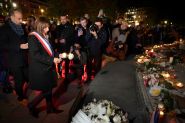- Home
- Middle East
- The Poisoned Chalice of Political Islam

©Shutterstock
For as long as I can remember, my identity as a Muslim has been a source of both pride and fear. Growing up in a post-9/11 world, I have lived under the shadow of suspicion, my faith often seen through the lens of terrorism, extremism, and political turmoil. From news headlines to Hollywood narratives, the image of Islam has been relentlessly associated with violence and intolerance, making it increasingly difficult to reconcile my beliefs with the distorted reflections seen in the eyes of others.
The fear wasn’t just external—it seeped into my personal life. I’ve faced prejudice, endured stereotyping, and even experienced the trauma of being jailed simply because of my religion. These experiences have left me questioning not only the global perception of Islam but also the role of political Islam in perpetuating divisions. I am exhausted by the burden of constantly explaining and defending my faith, which I see as deeply personal and spiritual, against a narrative that paints it as inherently political or aggressive.
It is also a call for a deeper understanding of the complexities of Islam and a rejection of the harmful caricatures perpetuated by extremists on all sides. This is where my struggle deepens. While I take issue with how the Western media has often reduced Muslims to monolithic caricatures, I also find myself at odds with many Muslims who, knowingly or not, reinforce these very stereotypes. I reject political Islam and the way it seeks to exploit faith for power, often at the cost of both progress and peace.
In recent decades, political Islam has become a destructive force, distorting the message of faith that more than a billion people call their spiritual compass. While Islam’s principles center on mercy, justice, and compassion, political Islamists weaponize its tenets for power, often ignoring the very moral values they claim to uphold. Worse, this exploitation has made the region fertile ground for foreign interference, particularly by agencies like the Mossad and the CIA, which have manipulated sectarian and extremist factions for their own geopolitical aims.
The idea of merging Islam with political governance isn’t inherently problematic; many Muslims yearn for a society aligned with Islamic ethics. But political Islam, as practiced today, often replaces spirituality with a lust for control. Groups and leaders, usually uneducated and fueled with ignorance and protected with old traditions, use religious rhetoric to justify corruption, authoritarianism, and violence. These actors claim divine legitimacy, but in reality, their motivations are far removed from God’s message.
Take Syria and Iraq as cautionary tales. In both countries, political Islamist groups have turned Islam into a divisive tool, fueling sectarianism. In Syria, political Islam merged with militant movements during the civil war, turning the conflict into a regional proxy battle. Meanwhile, in Iraq, political Islam exacerbated tensions between Sunnis and Shias after the fall of Saddam Hussein.
The Quran speaks clearly: “And hold firmly to the rope of Allah all together and do not become divided” (3:103). Yet, political Islam has only deepened rifts. These groups don’t represent God—they represent ignorance, power hunger, and a shallow understanding of their faith. Militant Islam is a Manufactured Catastrophe, exploited by Western intelligence.
Adding fuel to the fire, foreign powers have capitalized on these divisions, often creating and arming the very militants they claim to fight. The CIA’s role in Afghanistan during the 1980s is a glaring example. By funneling money and weapons to the mujahideen to counter Soviet influence, the US laid the groundwork for extremist ideologies to flourish. Once the Soviets left, these groups morphed into networks like the Taliban and, later, al-Qaeda.
Fast forward to the rise of ISIS. Many analysts point to how the US-led invasion of Iraq created the chaos and power vacuum that allowed extremist groups to thrive. The Mossad and other intelligence agencies, too, have been accused of leveraging sectarian strife to weaken regional rivals. By stoking divisions between Sunni and Shia Muslims, these agencies ensured perpetual instability in countries like Syria, Lebanon, and Yemen.
ISIS, in particular, symbolizes the ultimate perversion of political Islam. This so-called “Islamic State” twisted Islamic teachings into a grotesque justification for barbarism. Its existence helped justify endless foreign intervention, from Russian airstrikes to US drone campaigns, further destabilizing the region and displacing millions.
The human cost of this toxic mix of political Islam and foreign manipulation is staggering. In Syria, over a decade of war has left more than 500,000 dead and 9 million displaced. The Assad regime, backed by Russia and Iran, exploited militant Islamists to delegitimize the opposition. Meanwhile, in Iraq, communities that once lived side by side have been torn apart by sectarian violence, much of it fueled by extremist rhetoric.
What’s left is a generation of disillusioned Muslims who see their faith reduced to political slogans and militant manifestos. This is a travesty, as Islam’s true message has little to do with the power struggles of political elites. So what’s the way forward?
The answer lies in decoupling Islam from politics. Faith should inspire values of justice and compassion, not serve as a tool for authoritarian regimes or militant factions. Muslims around the world must reclaim their narrative, emphasizing scholarship, spirituality, and unity over divisive rhetoric.
Foreign powers, for their part, must stop exploiting the Middle East as a chessboard. Western nations often claim to promote democracy, but their actions have too often sown chaos. If anything, the meddling of agencies like the CIA and Mossad has only emboldened extremists and entrenched authoritarianism.
The key for liberation is to Invest in education and culture.
A strong economy, can profoundly influence education, ultimately playing a pivotal role in eliminating poverty and ignorance. Education enables individuals to access higher-paying jobs and escape poverty. A well-educated population also contributes to a knowledge-driven economy, creating a virtuous cycle. A good economy sets the foundation for sustainable education initiatives, which in turn empower individuals to break free from poverty and ignorance. By prioritizing education as an investment rather than an expense, societies can create a cycle of prosperity and progress.
The Quran frequently emphasizes the importance of knowledge, reflection, and understanding, presenting the pursuit of knowledge as a form of worship and a way to draw closer to God.
I can give dozens of examples from the holy book, if I had more words count for this article.
Islam's emphasis on knowledge has historically inspired scientific, intellectual, and cultural advancements, showcasing the religion’s alignment with the pursuit of understanding.
It’s time to recognize that political Islam is a poisoned chalice. It distorts religion, destroys communities, and serves as a pretext for foreign powers to manipulate and exploit. True Islam calls for unity, peace, and justice. Let’s not allow the ignorance of a few to overshadow the beauty of the faith.
Read more



Comments